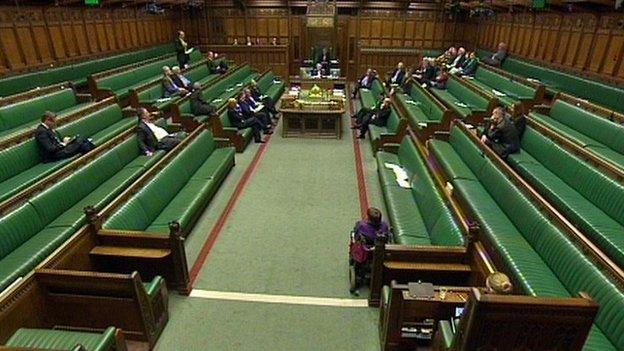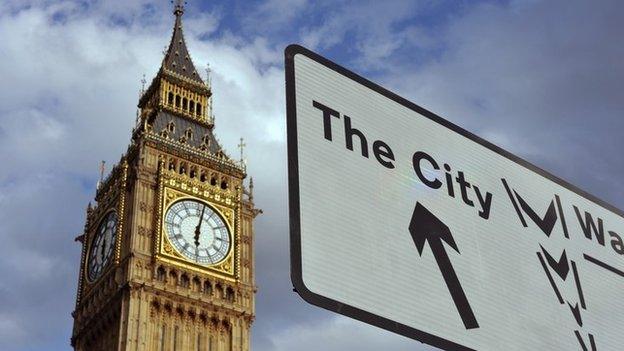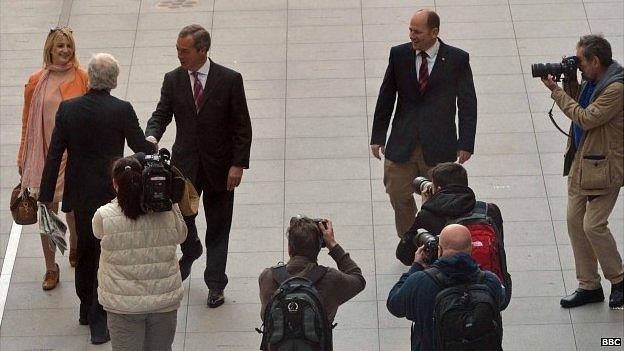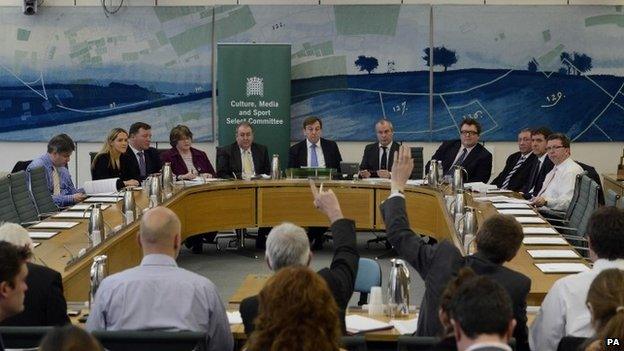The future for our Parliament in an era of anti-politics
- Published

MPs are counting down the clock to the general election, with key decisions put off until after the poll
Take a stroll around the corridors of Westminster these days and it will not take you long to pass a parade of gloomy faces: MPs rarely troubled by legislation in these dog days of an enforced five-year Parliament, hanging around with little to do but fret about the future.
Their fear is not just the personal uncertainty of an approaching general election. It is also the sense that the old political order is changing and they perhaps are being left behind.
Some of their concern is familiar: fewer people want to join or vote for their parties; fewer people trust them to tell the truth, let alone deliver on their promises, and fewer people feel engaged with what many see as a distant political world detached from their lives.
The war in Iraq; the broken commitments; the expenses scandal, and the more recent "Sexminster" allegations have created an impression in some people's minds that MPs' sole purpose in life is to deceive voters, pick the public pocket and sleep with their assistants.
Westminster's irrelevance
In the face of such grinding disillusionment, MPs struggle on in their work as a mood of anti-politics sweeps the country, filling ballot boxes with votes for upstart insurgent new parties.
So far, so predictable. Many an undergraduate in recent years has turned over their exam paper to read: "Politics is bust: how can it be fixed?" But is it politics that is bust or Parliament itself?

Parliament has ceded power to other institutions, including the City and Brussels
For what troubles many MPs is not that they are distrusted by an unforgiving public. It is the nagging fear that voters no longer think what goes on at Westminster matters.
People have clocked that in recent years power has been flowing out of Parliament like an ebb tide on the Thames. They have understood that many of the decisions that daily affect their lives are no longer made at Westminster.
Their interest rates are set by the Bank of England. Their energy prices are set by world oil prices. Their job security is determined by the vicissitudes of global markets.
Where power lies
The fate of their children's' schools is decided by independent regulators. Their health care is provided by an NHS no longer run by the Department of Health. Their public services are increasingly delivered by outsourced private companies one step removed from ministerial and Whitehall accountability.
The regulations that frame their businesses are established in Brussels. Their online lives are affected by decisions made by internet giants in California. Their criminal-justice system appears bound by foreign judges in Strasbourg. And at the same time, they see a parliament that has lost economic power to banks, financial institutions and global industries.

When it comes to matters of tax and war, Parliament is still at the centre of national life
Clearly this is an exaggeration. Westminster is not impotent. It still approves what is taxed and who gets welfare. It still signs off how much public money is spent in the Budget.
And it decides one-off issues such as same-sex marriage or the deployment of armed forces to a distant land. It is just that Westminster seems to matter less than it did, and MPs fear that voters have recognised this fact. Some politicians are already responding to this.
One senior minister told me recently that the coalition was deliberately front-loading Bills with secondary legislation so that fewer actual votes would be needed in the next parliament, a precaution against either minority or small majority government.
So is this the real crisis of politics - not voters' distrust, but their indifference?
Small parties growing
The truth, of course, is not quite so bleak. The Scotland referendum showed that when an issue is important enough, people engage in politics, not just by voting but by organising, debating and campaigning.
Support for larger parties may be falling but the opposite is true for smaller parties. UKIP's membership is growing fast, external and the party is hoping soon to overtake the Liberal Democrats.

UKIP and the Green Party have seen their membership numbers hit record highs in recent months
The Green Party is in rude health, recently doubling its membership and on occasion even outreaching the Lib Dems in opinion polls, external.
And as for the mainstream parties, they too are adapting, if rather slowly and clumsily. They are making membership more flexible, opening up to the use of social media to recruit and organise, and above all rethinking what it means to be a member of a political party in the 21st century.
As for poor old MPs, well they are not as venal as sometimes portrayed.
Yes, by definition, they have the self-assurance and ambition the rest of us lack to stand up and tell the world how it should be. But they also have the courage and humility to put themselves up for election so they can be judged by the people.
Today's MPs do more work in their constituencies than any of their predecessors. Many put loyalty to their electors above their party, as evidenced by their increasing willingness to rebel in the House of Commons.
Fighting back
And as for trust, polling figures suggest that disenchantment with the political classes is actually not at an all-time high, as is sometimes supposed. Although only one in five people today trusts politicians to tell the truth, it was actually worse in 1993 when one in seven felt the same.

Select committees can wield significant power, as during the phone-hacking hearings
Yet the problem of Parliament's relevance remains. Some MPs are fighting back. Select committee chairmen are doing their best to scrutinise power wherever it lies. Some MPs are using parliament to raise popular concerns. And others are hoping ever tougher powers for voters to "recall" and sack MPs will help make Westminster more accountable.
But perhaps Westminster's greatest chance might come from that which threatens it. If the old routine of one mass membership party swapping government with another is at an end, then coalition - or even minority government - might become not an aberration but the norm.
At worst, this could condemn Parliament to perpetual coalition-building as introspective parties haggle over policy and position.
But at best, it could help revive an interest in this beleaguered institution if votes in the House of Commons actually begin to matter again and play a bigger role in determining policy.
It will not solve everything but it might be a start.
- Published10 October 2014
- Published19 September 2014